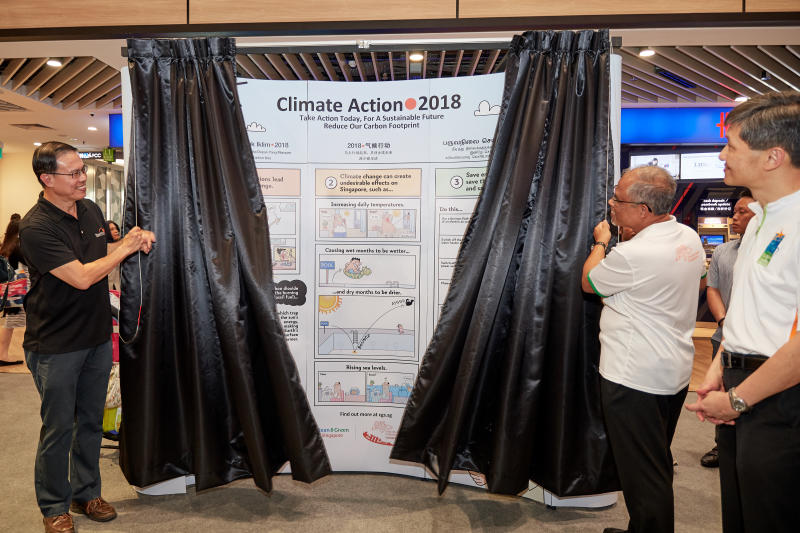Singapore's household electricity consumption up 17 per cent over past decade
Sign up now: Get ST's newsletters delivered to your inbox

North West CDC Mayor Teo Ho Pin (left) and Environment and Water Resources Minister Masagos Zulkifli unveil new comic strips for the campaign, drawn by Straits Times artist Lee Chee Chew, as NEA Chief Executive Ronnie Tay (right) looks on.
PHOTO: LIN ZHAOWEI FOR THE STRAITS TIMES
SINGAPORE - Singapore's household electricity consumption has increased by about 17 per cent over the past decade, the National Environment Agency said on Saturday (May 5).
Households here consumed a total of 7,295 GWh (gigawatt hours) last year, which is the equivalent of each home spending about $1,000 a year on electricity.
A 2017 NEA survey of 550 households found that air-conditioners were largely to blame, accounting for about 24 per cent of the consumption of a typical home.
Refrigerators accounted for 17 per cent, while water heaters were responsible for about 11 per cent of electricity consumption.
Four in five households said cost savings would motivate them to take steps to save energy, but not if it inconveniences them.
For example, while 84 per cent of those surveyed agreed that using a fan instead of the air-conditioner would save energy, only 71 per cent did so, saying they valued personal comfort more.
As part of efforts to get people here to save energy, the NEA launched the second annual Energy-Saving Challenge on Saturday.
The challenge, which will run from May to August this year, aims to get households here to cut electricity use by at least one per cent. They can achieve this by switching off appliances after use and setting air-conditioners at temperatures of 25 deg C or higher.
Those who manage to achieve the target stand to win prizes.
Last year's challenge saw almost 7,000 participants achieving savings of about 330,000 kWh - the electricity needed to power 1,000 three-room Housing Board flats for more than a month.
The reduction of carbon emissions as a result was equivalent to taking 256 cars off the roads, said Environment and Water Resources Minister Mr Masagos Zulkifli, who launched this year's challenge at Northpoint City in Yishun.
Cutting energy consumption will help reduce Singapore's carbon footprint as well as the impact of climate change, he said, noting as a low-lying island Singapore is particularly vulnerable to rising sea levels.
"It's not just about saving money," he said.
Those interesting in signing up for the Energy-Saving Challenge can visit www.cgs.sg for more information.


